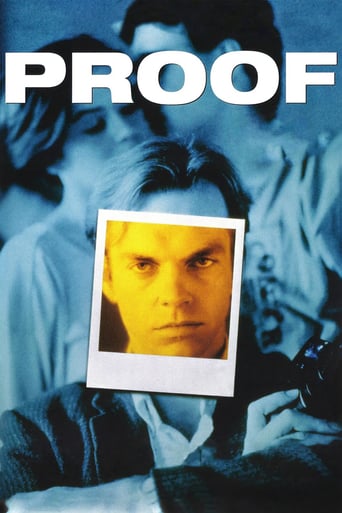

When I heard that this story involved a blind photographer my first reaction was, "I don't get it." So, one reason I watched this was to see how that premise could play out in any realistic way. And it does. Martin (Hugo Weaving) is the photographer; he takes photos and has people describe them to him. Dating to the relationship with his mother in childhood Martin has an industrial strength case of distrust.Celia (Geneviève Picot) is Martin's housekeeper and the relationship between Martin and Celia is the central focus of the movie. We don't get too far into it before we realize that Celia is deeply in love with Martin, a love that he does not reciprocate. This situation seems to be agreeable to both parties--in fact they appear to get a thrill out of thwarting each other. For example, Celia moves objects around the house just so Martin will crash into them.The game that Martin and Celia are playing is thrown off center when Andy (a young Russell Crowe) befriends Martin, and that is when things get interesting. Andy finds Martin's hobby curious and is happy to describe the photos for him. How Celia uses her sexuality to deal with her jealousy, how Martin uses his photos to deal with his trust problems, and how poor, innocent Andy deals with being sucked into the vortex of this battle of wills is what makes the movie engaging. It reminds me of how the innocent young professor and his wife were pulled into the private war that George and Martha were fighting in "Who's Afraid of Virginia Woolf?"I had a little problem with the casting. It was hard to see what Celia found in Martin that would create an obsessive love, but I suppose in the area of sex and love anything is possible. And it was difficult for me to believe that the eminently handsome and likable Andy could have been alone in the world, so alone as to befriend Martin.
... View MoreFor months, my movie-going experience had been reduced to blockbusters filled with explosions and bad one-liners. Then I rented Proof, and forgot why I ever wanted to see a car blow up on a screen.This is a very simple, very down-to-earth film. It focuses on three characters - a blind man convinced that everyone will take advantage of his handicap; a lonely woman who does not realize that people cannot be blackmailed or sabotaged into falling in love; and a young, ordinary guy who is trapped between the two. Their story is primarily that of trust, but it is also about absolutes and why humanity needs to overcome them.Although there is nothing earth-shattering about the scenography itself, the film is beautifully shot. The acting is wonderful. Weaving is absolutely convincing as a blind man, and Crowe is so charmingly average and regular that it is hard to believe that this is the same person who gave Hando and Maximus their sublime intensity. There is depth, levity, refined sarcasm, and crude humor - something for everyone. I definitely - and highly - recommend watching it.
... View MoreFor my Social Psychology class, my teacher showed this movie for one of our first lessons. The point of the movie was to not look at Martin, the main character, as a blind man, but as a fully capable person who was incidentally blind.Martin, the main character, is a blind man who uses a camera and pictures as his "eyes," trusting the character of Andy to faithfully describe these pictures so that Martin can "see" them. However, trust doesn't come easily to Martin, who doubts many people in his life including his housekeeper, Celia, who is madly in love with him, and even his own Mother, who through flashbacks we see was never really trusted. Martin giving his trust to Andy, someone he barely knows, makes Celia angry and sets off a chain of events.The story evolves from there, each scene an important piece of the puzzle (which is refreshing, no scenes are put there just to be there). The main theme of this movie is the element of trust, which Martin seems to lack, Andy seems eager to give, and Celia wants to receive. Looking at Martin as a person, not as a blind man, makes this movie all the more rich. Martin is easily related to - Trusting someone and expecting honesty is something we all want. Similarly, Martin wants control of his life (and is by all means capable of it), but he still has that element of vulnerability, despite how much he tries to deny it. Martin must also accept the fact that people are not always perfect. They lie sometimes, and sometimes that's okay. All in all, this movie is amazingly crafted, well written, and funny.
... View MoreThis deliciously enticing bit of cinema from Down Under revolves around the activities of three people: A mistrustful blind man, a desperate, love-hungry woman, a misguided young man, and what happens when these three paths intersect.Martin is a misanthropic blind man, whose unshakable mistrust of humanity compels him to compulsively take photographs of everything around him. So deeply-rooted is his paranoia that he believes his own mother rejected him because of his handicap, and so deceived him in her descriptions of the world. Martin took a picture--his first--of a garden his mother customarily described to him, as evidence that she had lied.Martin's paranoia that anyone might be lying to him has shaped the rest of his life, growing up to become uncompromising and fiercely independent. He behaves callously in his only human interaction--with his rancorous housekeeper, Celia. Celia is obsessively, possessively in love with Martin. But their relationship is a prickly one, marked with cruelty and malice on both parts. Martin, aware of Celia's desire for him, uses the knowledge as a weapon--tormenting her by keeping her on, but rebuffing her attempts. In return, Celia spitefully rearranges the furniture so Martin will run into it and exploits his dependency on her to boost her own ego.Years later, Martin is still a photographer, but now he wants someone he can trust to describe his first photo to him, thus giving him the 'proof' of a long-dead mother's love.This someone happens to be Andy, a dishwasher at a local restaurant. But when Andy threatens to become too great an influence in Martin's life, Celia, feeling her territory has been violated, sets out to discredit Andy--using her sexuality to control both men."Proof" could all so easily have slipped into melodramatic theatrics, but the film skips nimbly along the line, managing to evade all potential traps. Most of the credit is due to the adroit, agile script and the outstanding performances from the cast.Jocelyn Moorhouse, the film's director and writer, has the innate gift of comprehending, capturing, and conveying the human condition so aptly, so that the audience is deftly drawn into these characters' lives. The film doesn't rely on a contrived plot to induce interest; these ordinary characters are intrinsically fascinating simply because of who they are.The acting is superb, making for a fabulous ensemble piece. Hugo Weaving renders a thoughtful performance as Martin, convincingly portraying a man who has closed himself off so effectively against the possibility that he might get hurt, that he has cut off the possibility of feeling. Genevieve Picot is likewise excellent, marvelously calculating, yet vulnerable as Celia. And Russel Crowe radiates an already unmistakable and irresistible charisma on-screen in this early role as Andy. His easy-going, honest, bloke-next-door charm is utterly appealing--a far cry from later roles in "L.A. Confidential" and "Gladiator", showing his incredible acting range.This diabolically clever, enormously witty, and refreshingly original film can be hilariously funny at some times, genuinely heart-rending at others, and an all-round brilliant bit of cinema. Well-worth a look.
... View More